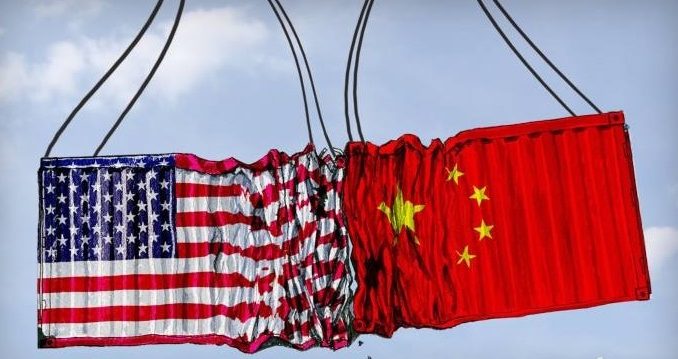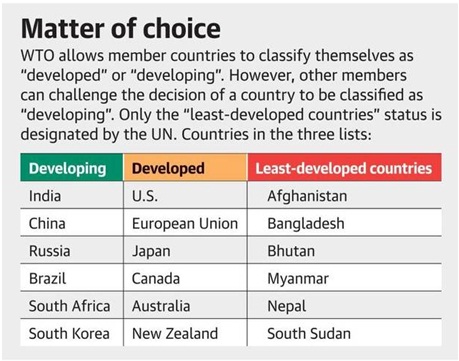
Context: U.S President Donald Trump threats repeatedly to dismember U.S. from WTO
- In the pretext of U.S-China trade war, President Donald Trump urges WTO to rethink the status of ‘developing country’ given to some countries.
- President Trump said that countries like China and India have taken advantage of their ‘developing’ status at the WTO.
- Previously, while addressing the United States Trade Representative (USTR) President Trump raised this concern and asked USTR to convince WTO about US concerns.
World Trade Organization (WTO)
- World Trade Organization was established in 1995 and replaced the General Agreement of Trade and Treaties by providing an institutional set up for regulating international trade.
- WTO offers a regulatory framework to negotiate international trade agreements and it aims to provide a free, smooth and predictable flow of trade in goods, services, and intellectual property.
- WTO reviews National Trade Policies and offers a level playing field by providing assistance to developing least developed and low-income countries.
What actually is a Developing Country and what does this status entail?
- The WTO itself does confer the status of ‘developing’ or ‘developed’ country to any of its member states. The member countries announce themselves as such and the announcement is subject to challenge by other countries. However, the status of ‘least developed country’ is assigned by the United Nations.
- Two third of all 164 member states have the status of ‘developing’ countries. The status gives the power to a developed country to seek a limited immunity from WTO rules.
- To protect their interest the countries with ‘developing’ status can impose high import tariffs and are also allowed to offer subsidies to the domestic producers.
- The exemptions, in the form of assistance by the WTO, are seen as an impediment to their interest by the developed countries.

The remedies:
In case of unfair competition causing impairment to a domestic industry, the WTO offers remedies by granting a temporary exemption from WTO rules. The remedies are classified as follows:
Anti Dumping Measures:
- Dumping takes places when the price of a product in the exported country is less than the price in the exporting country. The price at which the product is sold in the exported marked it called ‘dumped price’. The difference between the price in the exporting and exported country is called ‘dumping margin’. The process of dumping is an example of price discrimination.
- The products at the dumped price hold a competitive advantage. This unfair advantage can injure the industry in the exported country.
- The member countries are allowed to take anti-dumping duty measures to prevent the domestic industry from any injury. However, the extent of such measure is determined by the dumping margin. To get the ‘fair’ trade price, the dumping margin is added to the dumped price.
Subsidies and special “countervailing” duties to offset the subsidies:
- Government subsidies can give excessive protection to the domestic industries which can act as a discouraging tool to restrict foreign imports. Similarly, subsidy on an export product can injure the domestic industry of the importing country.
- Thus, WTO rules prohibit subsidies on export products as well as subsidies which are directed to the use of domestic over imported products.
- Additionally, a member country can impose ‘countervailing duties’ on the subsidized imported product if it threatens to injure the domestic industry of the product, even if it is not prohibited by the WTO rules.
- Subsidies play a significant role in developing economies. Those least developed and developing countries which are having the per capita GNP of $1000 are exempted from the rules of prohibited export subsidies.
- If the exports of a developing country are facing countervailing duties investigations, they get preferential treatment.
WTO: Issues and Challenges
- The unilateral and countermeasures by some member countries are posing challenges to international trade. The appellate body of WTO’s dispute setting mechanism is facing an impasse in the selection of its members.
- India supports the mechanism to address the concerns of developing and least developed countries and is a strong supporter of multilateral international trade.
- The ongoing U.S-China trade war is challenging the organization not only on the grounds of its status of ‘developing country’ but also as the role of the organization in the bilateral trade conflict.
Decoding the Trump threat:
- US President Donald Trump’s threat to dismember United states from the WTO should be seen as a pretext to justify the trade barrier imposed on China by the USA. Therefore, the comments imply that WTO is advised to not to step in the ongoing trade war.
- The imposition of trade barriers and taking overly protective measures for the domestic industries area the reflection of Donald Trump’s ‘America First’ policy as America’s manufacturing industry has been badly affected by the open competition.
Conclusion:
- The WTO is facing existential challenges in its role and viability. The ongoing trade war between the U.S and China is paralyzing the organization with a risk of rendering the organization completely dysfunctional.

Leave a Reply
You must be logged in to post a comment.